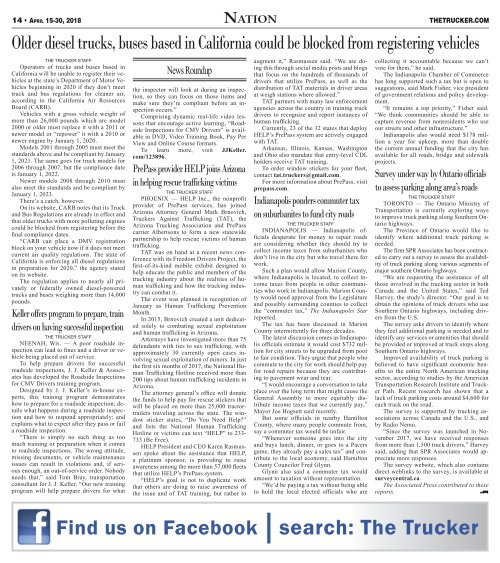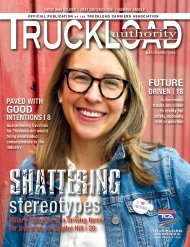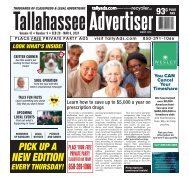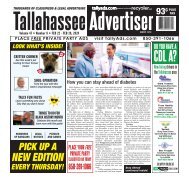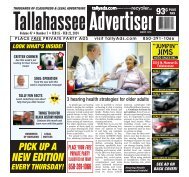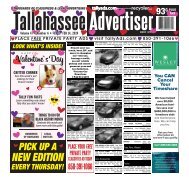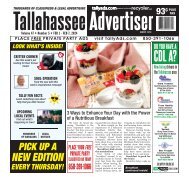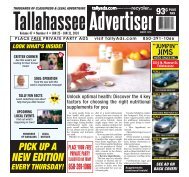The Trucker Newspaper - April 15, 2018
Create successful ePaper yourself
Turn your PDF publications into a flip-book with our unique Google optimized e-Paper software.
14 • <strong>April</strong> <strong>15</strong>-30, <strong>2018</strong> Nation<br />
THE TRUCKER STAFF<br />
Operators of trucks and buses based in<br />
California will be unable to register their vehicles<br />
at the state’s Department of Motor Vehicles<br />
beginning in 2020 if they don’t meet<br />
truck and bus regulations for cleaner air,<br />
according to the California Air Resources<br />
Board (CARB).<br />
Vehicles with a gross vehicle weight of<br />
more than 26,000 pounds which are model<br />
2000 or older must replace it with a 2011 or<br />
newer model or “repower” it with a 2010 or<br />
newer engine by January 1, 2020.<br />
Models 2001 through 2005 must meet the<br />
standards above and be compliant by January<br />
1, 2021. <strong>The</strong> same goes for truck models for<br />
2006 through 2007, but the compliance date<br />
is January 1, 2022.<br />
Newer models 2008 through 2010 must<br />
also meet the standards and be compliant by<br />
January 1, 2023.<br />
<strong>The</strong>re’s a catch, however.<br />
On its website, CARB notes that its Truck<br />
and Bus Regulations are already in effect and<br />
that older trucks with more polluting engines<br />
could be blocked from registering before the<br />
final compliance dates.<br />
“CARB can place a DMV registration<br />
block on your vehicle now if it does not meet<br />
current air quality regulations. <strong>The</strong> state of<br />
California is enforcing all diesel regulations<br />
in preparation for 2020,” the agency stated<br />
on its website.<br />
<strong>The</strong> regulation applies to nearly all privately<br />
or federally owned diesel-powered<br />
trucks and buses weighing more than 14,000<br />
pounds.<br />
Keller offers program to prepare, train<br />
drivers on having successful inspection<br />
THE TRUCKER STAFF<br />
NEENAH, Wis. — A poor roadside inspection<br />
can lead to fines and a driver or vehicle<br />
being placed out of service.<br />
To help prepare drivers for successful<br />
roadside inspections, J. J. Keller & Associates<br />
has developed the Roadside Inspections<br />
for CMV Drivers training program.<br />
Designed by J. J. Keller’s in-house experts,<br />
this training program demonstrates<br />
how to prepare for a roadside inspection; details<br />
what happens during a roadside inspection<br />
and how to respond appropriately; and<br />
explains what to expect after they pass or fail<br />
a roadside inspection.<br />
“<strong>The</strong>re is simply no such thing as too<br />
much training or preparation when it comes<br />
to roadside inspections. <strong>The</strong> wrong attitude,<br />
missing documents, or vehicle maintenance<br />
issues can result in violations and, if serious<br />
enough, an out-of-service order. Nobody<br />
needs that,” said Tom Bray, transportation<br />
consultant for J. J. Keller. “Our new training<br />
program will help prepare drivers for what<br />
the inspector will look at during an inspection,<br />
so they can focus on those items and<br />
make sure they’re compliant before an inspection<br />
occurs.”<br />
Comprising dynamic real-life video lessons<br />
that encourage active learning, “Roadside<br />
Inspections for CMV Drivers” is available<br />
in DVD, Video Training Book, Pay Per<br />
View and Online Course formats.<br />
To learn more, visit JJKeller.<br />
com/123896.<br />
PrePass provider HELP joins Arizona<br />
in helping rescue trafficking victims<br />
THE TRUCKER STAFF<br />
PHOENIX — HELP Inc., the nonprofit<br />
provider of PrePass services, has joined<br />
Arizona Attorney General Mark Brnovich,<br />
<strong>Trucker</strong>s Against Trafficking (TAT), the<br />
Arizona Trucking Association and PrePass<br />
carrier Albertsons to form a new statewide<br />
partnership to help rescue victims of human<br />
trafficking.<br />
TAT was on hand at a recent news conference<br />
with its Freedom Drivers Project, the<br />
first-of-its-kind mobile exhibit designed to<br />
help educate the public and members of the<br />
trucking industry about the realities of human<br />
trafficking and how the trucking industry<br />
can combat it.<br />
<strong>The</strong> event was planned in recognition of<br />
January as Human Trafficking Prevention<br />
Month.<br />
In 20<strong>15</strong>, Brnovich created a unit dedicated<br />
solely to combating sexual exploitation<br />
and human trafficking in Arizona.<br />
Attorneys have investigated more than 75<br />
defendants with ties to sex trafficking, with<br />
approximately 30 currently open cases involving<br />
sexual exploitation of minors. In just<br />
the first six months of 2017, the National Human<br />
Trafficking Hotline received more than<br />
200 tips about human trafficking incidents in<br />
Arizona.<br />
<strong>The</strong> attorney general’s office will donate<br />
the funds to help pay for rescue stickers that<br />
will be placed on more than 25,000 tractortrailers<br />
traveling across the state. <strong>The</strong> window<br />
sticker states, “Do You Need Help?”<br />
and lists the National Human Trafficking<br />
Hotline or victims can text “HELP” to 233-<br />
733 (Be Free).<br />
HELP President and CEO Karen Rasmussen<br />
spoke about the assistance that HELP,<br />
a platinum sponsor, is providing to raise<br />
awareness among the more than 57,000 fleets<br />
that utilize HELP’s PrePass system.<br />
“HELP’s goal is not to duplicate work<br />
that others are doing to raise awareness of<br />
the issue and of TAT training, but rather to<br />
augment it,” Rasmussen said. “We are doing<br />
this through social media posts and blogs<br />
that focus on the hundreds of thousands of<br />
drivers that utilize PrePass, as well as the<br />
distribution of TAT materials in driver areas<br />
at weigh stations where allowed.”<br />
TAT partners with many law enforcement<br />
agencies across the country in training truck<br />
drivers to recognize and report instances of<br />
human trafficking.<br />
Currently, 23 of the 32 states that deploy<br />
HELP’s PrePass system are actively engaged<br />
with TAT.<br />
Arkansas, Illinois, Kansas, Washington<br />
and Ohio also mandate that entry-level CDL<br />
holders receive TAT training.<br />
To order window stickers for your fleet,<br />
contact tat.truckers@gmail.com.<br />
For more information about PrePass, visit<br />
prepass.com.<br />
Indianapolis ponders commuter tax<br />
on suburbanites to fund city roads<br />
THE TRUCKER STAFF<br />
INDIANAPOLIS — Indianapolis officials<br />
desperate for money to repair roads<br />
are considering whether they should try to<br />
collect income taxes from suburbanites who<br />
don’t live in the city but who travel there for<br />
work.<br />
Such a plan would allow Marion County,<br />
where Indianapolis is located, to collect income<br />
taxes from people in other communities<br />
who work in Indianapolis. Marion County<br />
would need approval from the Legislature<br />
and possibly surrounding counties to collect<br />
the “commuter tax,” <strong>The</strong> Indianapolis Star<br />
reported.<br />
<strong>The</strong> tax has been discussed in Marion<br />
County intermittently for three decades.<br />
<strong>The</strong> latest discussion comes as Indianapolis<br />
officials estimate it would cost $732 million<br />
for city streets to be upgraded from poor<br />
to fair condition. <strong>The</strong>y argue that people who<br />
commute to the city for work should help pay<br />
for road repairs because they are contributing<br />
to pavement wear and tear.<br />
“I would encourage a conversation to take<br />
place over the long term that might cause the<br />
General Assembly to more equitably distribute<br />
income taxes that we currently pay,”<br />
Mayor Joe Hogsett said recently.<br />
But some officials in nearby Hamilton<br />
County, where many people commute from,<br />
say a commuter tax would be unfair.<br />
“Whenever someone goes into the city<br />
and buys lunch, dinner, or goes to a Pacers<br />
game, they already pay a sales tax” and contribute<br />
to the local economy, said Hamilton<br />
County Councilor Fred Glynn.<br />
Glynn also said a commuter tax would<br />
amount to taxation without representation.<br />
“We’d be paying a tax without being able<br />
to hold the local elected officials who are<br />
THETRUCKER.COM<br />
Older diesel trucks, buses based in California could be blocked from registering vehicles<br />
News Roundup<br />
collecting it accountable because we can’t<br />
vote for them,” he said.<br />
<strong>The</strong> Indianapolis Chamber of Commerce<br />
has long supported such a tax but is open to<br />
suggestions, said Mark Fisher, vice president<br />
of government relations and policy development.<br />
“It remains a top priority,” Fisher said.<br />
“We think communities should be able to<br />
capture revenue from nonresidents who use<br />
our streets and other infrastructure.”<br />
Indianapolis also would need $178 million<br />
a year for upkeep, more than double<br />
the current annual funding that the city has<br />
available for all roads, bridge and sidewalk<br />
projects.<br />
Survey under way by Ontario officials<br />
to assess parking along area’s roads<br />
THE TRUCKER STAFF<br />
TORONTO — <strong>The</strong> Ontario Ministry of<br />
Transportation is currently exploring ways<br />
to improve truck parking along Southern Ontario<br />
highways.<br />
<strong>The</strong> Province of Ontario would like to<br />
identify where additional truck parking is<br />
needed.<br />
<strong>The</strong> firm SPR Associates has been contracted<br />
to carry out a survey to assess the availability<br />
of truck parking along various segments of<br />
major southern Ontario highways.<br />
“We are requesting the assistance of all<br />
those involved in the trucking sector in both<br />
Canada and the United States,” said Ted<br />
Harvey, the study’s director. “Our goal is to<br />
obtain the opinions of truck drivers who use<br />
Southern Ontario highways, including drivers<br />
from the U.S.<br />
<strong>The</strong> survey asks drivers to identify where<br />
they feel additional parking is needed and to<br />
identify any services or amenities that should<br />
be provided or improved at truck stops along<br />
Southern Ontario highways.<br />
Improved availability of truck parking is<br />
believed to have significant economic benefits<br />
to the entire North American trucking<br />
sector, according to studies by the American<br />
Transportation Research Institute and <strong>Trucker</strong><br />
Path. Recent research has shown that a<br />
lack of truck parking costs around $4,600 for<br />
each truck on the road.<br />
<strong>The</strong> survey is supported by trucking associations<br />
across Canada and the U.S., and<br />
by Radio Nemo.<br />
“Since the survey was launched in November<br />
2017, we have received responses<br />
from more than 1,500 truck drivers,” Harvey<br />
said, adding that SPR Associates would appreciate<br />
more responses.<br />
<strong>The</strong> survey website, which also contains<br />
direct weblinks to the survey, is available at<br />
surveycentral.ca.<br />
<strong>The</strong> Associated Press contributed to these<br />
reports. 8<br />
Find us on Facebook<br />
search: <strong>The</strong> <strong>Trucker</strong>


